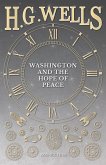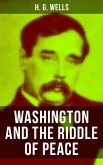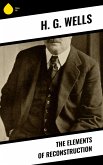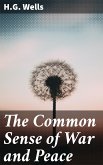In "Washington and the Riddle of Peace," H. G. Wells embarks on a profound exploration of international relations and the quest for sustainable peace in the aftermath of World War I. Employing a blend of narrative and persuasive prose, Wells critiques the prevailing political ideologies of the early 20th century while advocating for a new global political order. His literary style combines rigorous argumentation with visionary idealism, drawing on historical precedent and contemporary events to unravel the complexities of diplomacy and conflict resolution. Set against the backdrop of the League of Nations' formation, the book poses essential questions about governance, justice, and the role of power in shaping human destiny. H. G. Wells, renowned for his pioneering contributions to science fiction, was deeply influenced by the tumultuous events of his time, including the Great War, which spurred his commitment to social reform and enlightened governance. His experiences as an observer of societal change and a participant in peace movements infused his writing with a sense of urgency and idealism, as he grappled with humanity's capacity for both destruction and cooperation. This work reflects his belief in the transformational power of ideas. "Washington and the Riddle of Peace" is an essential read for those seeking to understand the intricacies of peace-making in a globalized world. As relevant today as it was in 1918, Wells' insights invite readers to ponder the moral responsibilities of nations and the possibility of a more just and peaceful future. This book is a compelling call to action for policymakers, scholars, and anyone concerned about the challenges of achieving world peace. In this enriched edition, we have carefully created added value for your reading experience: - A succinct Introduction situates the work's timeless appeal and themes. - The Synopsis outlines the central plot, highlighting key developments without spoiling critical twists. - A detailed Historical Context immerses you in the era's events and influences that shaped the writing. - An Author Biography reveals milestones in the author's life, illuminating the personal insights behind the text. - A thorough Analysis dissects symbols, motifs, and character arcs to unearth underlying meanings. - Reflection questions prompt you to engage personally with the work's messages, connecting them to modern life. - Hand-picked Memorable Quotes shine a spotlight on moments of literary brilliance. - Interactive footnotes clarify unusual references, historical allusions, and archaic phrases for an effortless, more informed read.
Dieser Download kann aus rechtlichen Gründen nur mit Rechnungsadresse in A, B, BG, CY, CZ, D, DK, EW, FIN, F, GR, H, IRL, I, LT, L, LR, M, NL, PL, P, R, S, SLO, SK ausgeliefert werden.









